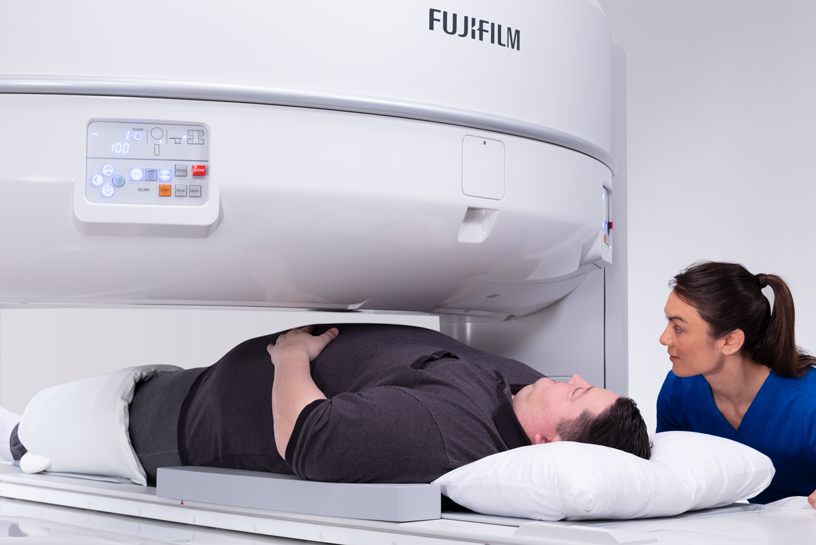
High Field Open MRI
Need an MRI in Hudson County, NJ?
Discover the pinnacle of Open MRI technology: the Fujifilm 1.2T High Field Open MRI.
- Superior Image Quality: Advances beyond traditional Open MRIs, delivering crisp, clear images.
- Competitive with Closed Systems: Matches the image quality of select closed MRI models.
- Efficient Scans: Reduces scan times to as brief as 15 minutes.
- Exclusive DTI Technology: Features Diffusion Tensor Imaging, a unique addition for diagnosing traumatic brain injuries—unmatched by any other private facility.
The Fujifilm 1.2T Velocity Open MRI redefines patient comfort and diagnostic precision. This system combines a 1.2 Tesla magnetic field—unusually powerful for an Open MRI—with a patient-centric design to offer an experience that’s both comfortable and clinically comprehensive.
Key Advantages:
- High-Field Strength: Ensures exceptional detail and diagnostic accuracy, on par with closed MRI systems.
- Open Comfort: Its design minimizes anxiety and accommodates patients of all sizes, including those prone to claustrophobia or with mobility challenges.
- Patient-Centric Features: Includes a wide table for easy access and positioning, along with ambient lighting and music options to enhance relaxation.
The Fujifilm Velocity Open MRI stands out for its ability to merge advanced imaging performance with an inclusive, patient-friendly approach, setting a new standard in MRI diagnostics.
Address
244 St Pauls Ave, Jersey City, NJ 07306
Call Us
(201) 201-3500
Email Us
office@njmri.com
Understanding MRIs: A Patient Guide
Magnetic Resonance Imaging (MRI) is a sophisticated diagnostic tool that produces detailed images of the inside of your body using a powerful magnetic field and radio waves. Unlike X-rays and CT scans, MRI does not use ionizing radiation, making it a safer alternative for imaging soft tissues, including the brain, spinal cord, muscles, and ligaments.
Before Your Appointment
- Preparation: Specific instructions may vary depending on the part of the body being scanned. You might be asked to fast for a few hours before the scan or to drink water if your abdomen is being examined. It’s important to inform your healthcare provider if you have implants (like pacemakers, cochlear implants, or certain types of clips or screws from previous surgeries) as these may affect your eligibility for an MRI.
- What to Wear: Comfortable, loose-fitting clothing without metal zippers, snaps, or buttons is best. You may be asked to change into a hospital gown to avoid interference with the magnetic field.
- Medical History: Be prepared to discuss your medical history, particularly any allergies or kidney problems, as a contrast agent might be used in some cases.
During the Procedure
- Procedure: You will lie down on a sliding table that moves into the MRI machine, which is a large, tube-shaped structure. Once inside, the MRI technician will communicate with you through an intercom system, instructing you to stay still at certain times to ensure clear images are captured.
- Duration: An MRI scan can take between 15 to 60 minutes, depending on the area being examined and the number of images needed.
- Comfort: The procedure is painless, but the machine can be quite loud, producing thumping and humming noises. You may be offered earplugs or headphones to help reduce the noise. Some patients feel claustrophobic inside the MRI machine; if you’re concerned about this, talk to your doctor beforehand as they may be able to provide medication to help you relax.
After the Procedure
- Results: The images from your MRI will be analyzed by a radiologist, who will then send a report to your doctor. Your doctor will discuss the findings with you and explain what they mean for your health and treatment plan.
- Follow-Up: Depending on the results, further testing, treatment, or follow-up scans may be recommended.
Additional Information
- Safety: MRIs are generally safe with no known side effects from the magnetic field or radio waves. However, the use of a contrast agent may pose a slight risk of allergic reaction or kidney issues, which is why your medical history is important.
- Uses: MRI is incredibly useful for diagnosing a wide range of conditions due to its ability to produce high-resolution images of soft tissues. It’s often used for examining the brain and spinal cord, detecting tumors and strokes, investigating joint abnormalities, and much more.
If you have any concerns about undergoing an MRI scan, don’t hesitate to discuss them with your healthcare provider, who can provide reassurance and additional information specific to your situation.
